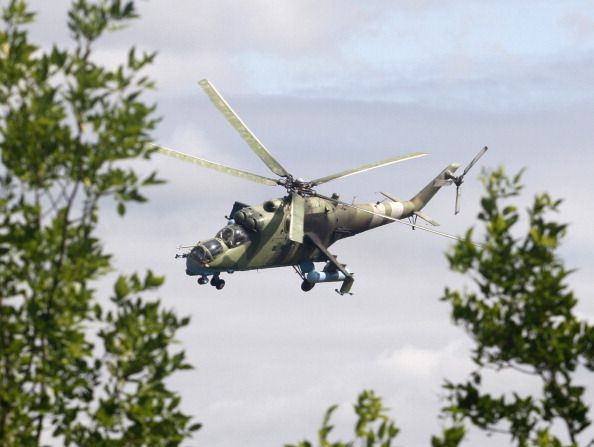DONETSK, Ukraine – The Ukrainian government has captured most of a town near Donetsk, tightening the noose around the key rebel-held stronghold, officials said on Tuesday.

Interior Minister Arsen Avakov said in a Facebook post that one soldier was killed and four wounded when a volunteer battalion came under mortar fire before entering the town of Ilovaysk, 18 kilometres (11 miles) east of Donetsk. Among the wounded is the commander of the Donbass battalion, Semyon Semenchenko, who said government soldiers destroyed three rebel checkpoints and four firing positions, and that fighting continues.
Government efforts to quell the pro-Russian separatist front have focused lately on gradually encircling Donetsk, the largest rebel-controlled city.
Volunteer battalions have proven essential in the government offensive against armed separatists in the mainly Russian-speaking east.
Ukrainian troops were also advancing in the neighbouring region. Col. Andriy Lysenko, a spokesman for Ukraine’s National Security Council, told reporters on Tuesday government troops have captured one neighbourhood in regional capital Luhansk and are fighting the rebels on city streets including the city centre.
Fighting between government troops and pro-Russian separatists in eastern Ukraine has forced nearly 344,000 people to flee their homes, according to the United Nations – a number that has only grown as the humanitarian situation in rebel-held cities deteriorates.

Get daily National news
The situation appears to be particularly dire in the city of Luhansk, near the Russian border, which has been left without electricity, running water or phone connections for 17 days. Independent reports from the besieged city are scarce since the area is very dangerous for journalists.
- Soldier who died by suicide in Las Vegas spoke of pain, trauma after Afghanistan
- Donald Trump’s sentencing set for Jan. 10. What could happen next
- Jill Biden receives $20,000 diamond as priciest gift from foreign leader in 2023
- Prince William mourns loss of former nanny’s stepson in New Orleans shooting
The city hall said in a statement on its website on Tuesday that Luhansk and its city centre came under fierce shelling overnight. An unspecified number of civilians were killed or wounded. Residents are standing in lines to buy bread as food supplies are running out, the city hall said. Authorities also raised the alarm about a potential outbreak of infectious diseases since household waste has not been taken out of town for more than two weeks amid sweltering heat.
Ukraine and the West have voiced concern about Russia’s military activity at the Ukrainian border. Moscow has said it can do what it wants within its borders but invited a mission from the Organization for Security and Cooperation in Europe to observe two border crossings in a bid to counter claims that the Kremlin is supplying the rebels with weapons.
Paul Picard, head of that mission, told reporters in a Russian border town on Tuesday that observers had seen a marked increase of military activity around the border points over the past week, including Russian helicopter activity. But he said no helicopters were observed crossing the border.
Picard also said that the observers had seen “groups of young men and women wearing military-style dress” moving back and forth across the border. No weapons or military vehicles were observed.
Tensions have been high over the past week since Russia said it plans to send a massive aid convoy to help people in eastern Ukraine. The International Committee of the Red Cross, which is expected to take responsibility for the convoy when it enters Ukraine, was still waiting for security guarantees from all sides Tuesday.
The Russian Foreign Ministry said in a statement that minister Sergey Lavrov and ICRC President Peter Maurer agreed to take steps “in the next several hours” to clear the way for the convoy to proceed to Ukraine.
The ministry quoted Maurer as saying that the ICRC had received the guarantees from Russia and the rebels but not from the Ukrainian government. Lysenko of the Ukrainian security council, however, said on Tuesday that Ukrainian customs officers have not cleared the convoy yet since the Red Cross has not received the security assurances from the insurgents.
—
Nataliya Vasilyeva in Kyiv, Ukraine, and Jim Heintz in Moscow contributed to this report.







Comments